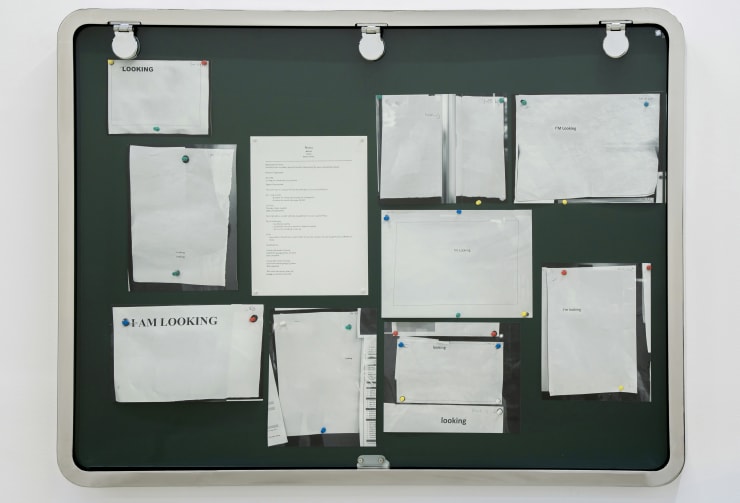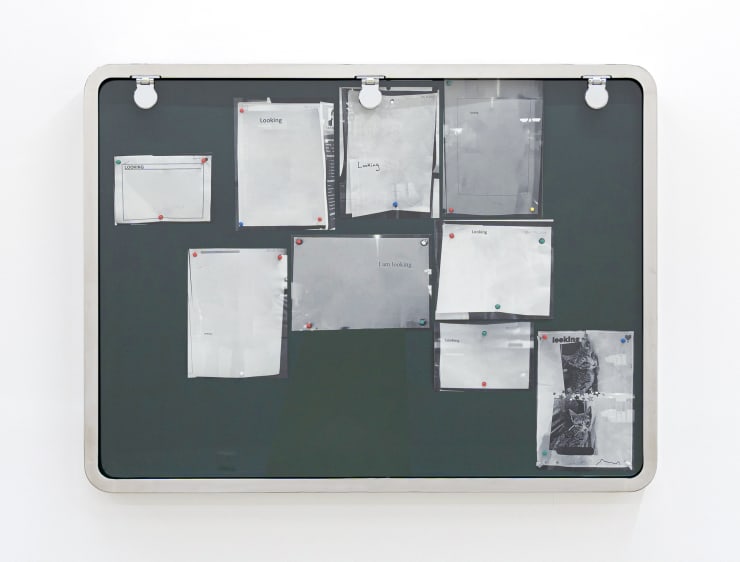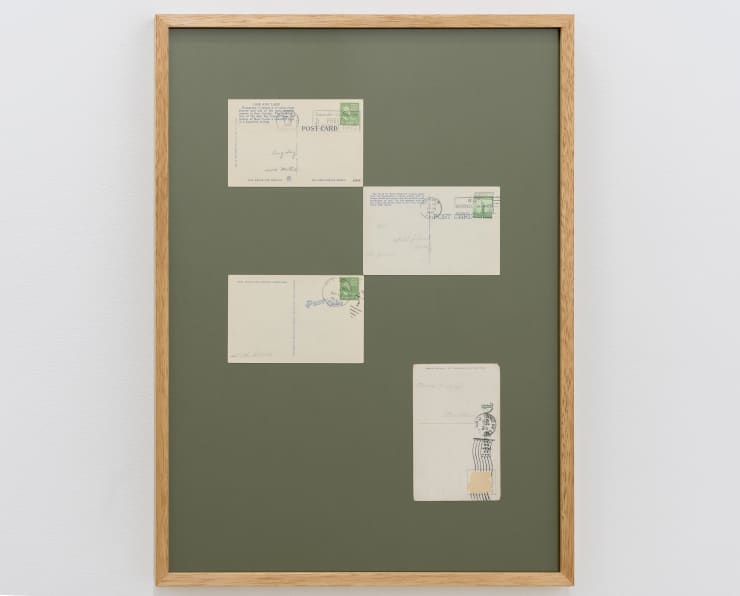Khalid Jauffer : Looking, dwelling, leaving
Consciousness and sensitivity are compromised states. Part and parcel of the comfort of habit is an ignorance of the environments we occupy, move between and pass, enjoying the ease of simplifying the lexicon of the public realm into digestible blocks, like consuming simple carbohydrates. It is in a less comfortable state of indefinite consciousness and sensitivity that Khalid occupies the world, finding, in the remains of society, metaphoric potential.
Discarded objects and broken things are legible to a bypasser primarily as ends, trash, the leftovers of a story that’s done being told; it is through a process of care and attention that Khalid transforms found ends into beginnings, unraveling tightly wound threads of human fragility encased in unremarkable shells.
Comprised of the left-behind shards of tiles from demolished homes collected over time, “Did you notice our walls start to crack?” hangs these pieces in a delicate balance between disrepair and memory; at once an homage to the witnesses our homes are to the minutiae of our lives and to the possibility that the antithetical qualities of beauty and ugliness can be held within the same thing.
The world is full of words that have already been issued: written and uttered. Richer than new words for the histories they’ve been steeped in and the infinite imaginations they can conjure, existing words become the medium in “Postcards”. “Postcards” makes new sentences out of lead from handwritten correspondences sent in the early 1900s, manipulating the forgotten sentiments of strangers entirely disconnected from one another in the magnitude of history into grafted compositions.
The simple act of looking is a necessary precursor to finding, it is crucially differentiated from seeking in that it is open-ended: it doesn’t prescribe its outcome. “Looking” foregrounds the universality of its eponym, picking up on the usage of the word consistently across job-seeking adverts posted on public notice boards encountered throughout the city. The commentary on looking becomes almost comic when refracted through the lens of spectatorship: you are looking at “looking” which was looked at and which was looking. Amongst all the proclamations of pursuit sits the ideal format of a CV, but what could be said between bullet points and single spacings are quiet pleas for a place within the city.
Sometimes an invitation can be sat waiting at one’s feet. “Alone” re-installs a hand-rendered duplicate of a street walker’s business card found lying on the street. A phone number accompanies the sole adjective, baitlike in its crypticity. Biting the bait, an unlikely conversation emerges on solitude and the multiplicities that lie within seeking: company, employment, purpose.
Borrowing from the public vernacular, modifying, and returning to the public vernacular is central to the process of uncovering metaphoric potential. In “Keys” this dance is enacted with playfulness: a lone key is observed on the wall of a mosque during a lunch break walk, for a week it is left untouched until Khalid picks it up, copies it at a key shop and returns it to its ledge, the next day it disappears. This is one of many copies of found keys that now sit like totems enshrined in a key box and adorned with apologetic, elaborate, and labor-intensive knots.
Read together, the five works in this exhibition form an unlikely lexicon. A constellation of things brought together, in spite of and because of their thingness, to elucidate their sociological underpinnings.
Text by Sarah Daher
-
 Khalid JaufferLooking I , 2024Edited found job seeking advertisements, archival inkjet print, pencil on paper, cork board pins, stainless steel custom notice boards90 x 120 x 8cm (framed)
Khalid JaufferLooking I , 2024Edited found job seeking advertisements, archival inkjet print, pencil on paper, cork board pins, stainless steel custom notice boards90 x 120 x 8cm (framed) -
 Khalid JaufferLooking II, 2024Edited found job seeking advertisements, archival inkjet print, pencil on paper, cork board pins, stainless steel custom notice boards90 x 120 x 8cm (framed)
Khalid JaufferLooking II, 2024Edited found job seeking advertisements, archival inkjet print, pencil on paper, cork board pins, stainless steel custom notice boards90 x 120 x 8cm (framed) -
 Khalid JaufferLooking III, 2024Edited found job seeking advertisements, archival inkjet print, pencil on paper, cork board pins, stainless steel custom notice boards90 x 120 x 8cm (framed)
Khalid JaufferLooking III, 2024Edited found job seeking advertisements, archival inkjet print, pencil on paper, cork board pins, stainless steel custom notice boards90 x 120 x 8cm (framed) -
 Khalid JaufferKeys, 2024Copy of found keys, print on glass, hand-tied keychains, pen on paper, FIS keybox55 x 38 x 8 cm
Khalid JaufferKeys, 2024Copy of found keys, print on glass, hand-tied keychains, pen on paper, FIS keybox55 x 38 x 8 cm -
 Khalid JaufferPostcards (Statue), 2024Pencil written postcards from eBay, stamps, eraser, artist frame72.5 x 72.5 x 3 cm (framed)
Khalid JaufferPostcards (Statue), 2024Pencil written postcards from eBay, stamps, eraser, artist frame72.5 x 72.5 x 3 cm (framed) -
 Khalid JaufferPostcards (Multi-millionaire), 1910 - 2024Pencil written postcards from eBay, stamps, eraser, artist frame
Khalid JaufferPostcards (Multi-millionaire), 1910 - 2024Pencil written postcards from eBay, stamps, eraser, artist frame -
 Khalid JaufferPostcards (Motel), 1910-2024Pencil written postcards from eBay, stamps, eraser, artist frame57.5 x cm.42.5 x 3 cm (framed)
Khalid JaufferPostcards (Motel), 1910-2024Pencil written postcards from eBay, stamps, eraser, artist frame57.5 x cm.42.5 x 3 cm (framed) -
 Khalid JaufferAlone, 2022 - 2024Pencil on paper, acrylic on wood, artist frameVarious dimensions
Khalid JaufferAlone, 2022 - 2024Pencil on paper, acrylic on wood, artist frameVarious dimensions -
 Khalid JaufferDid you notice our walls are starting to crack?, 2024Found house titles, piano strings, carbon fiber rods, steel wire, wooden pegsVarious dimensions
Khalid JaufferDid you notice our walls are starting to crack?, 2024Found house titles, piano strings, carbon fiber rods, steel wire, wooden pegsVarious dimensions










